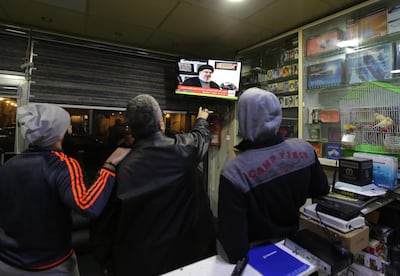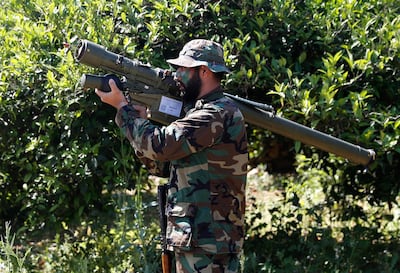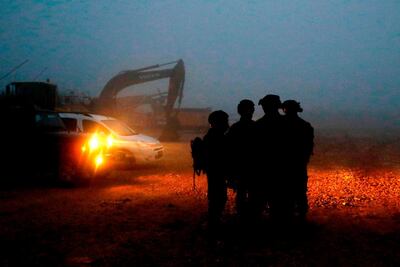Feeling the pinch of international sanctions, Hezbollah on Friday called on its supporters to donate money to the group.
In his latest appearance, Hassan Nasrallah said that the sanctions were a form of war and that the self-styled resistance group would respond to them as such.
Last month, the UK ended its long-held policy of distinguishing between the political and military arms of Hezbollah to classify the entire group and its subsidiaries as terrorist organisations.
The UK joined the United States, Canada and The Netherlands in its prescription of the group, but the move will not immediately much change to the way London deals with Beirut as it has long had a policy of no contact with Hezbollah since it supported the group's fighting against British forces in Iraq after 2003.
"I announce today that the resistance is in need of its [popular base]," Nasrallah said before calling on donations in order to help the group maintain its activities.
Most small contributions to the group come through a network of religious associations and the so-called "resistance support association" that Nasrallah said, "must significantly energise activities because we are in the heart of the battle.
"The resistance support association must provide an opportunity for jihad by money," Nasrallah said, quoting Quranic verses.
The Hezbollah leader said that he expects the US-led sanctions push to get tougher, saying that "we may see new names, new people and new organisations added to the sanctions list".
The Lebanese newspaper, Daily Star, reported that Hezbollah's TV station has been airing daily commercials calling for donations for the resistance support association.
"The sanctions and the terror lists are a form of war ... we should deal with them as if they are a war," Nasrallah said in a televised speech on Friday.
"Their actions will not be able to make us poor, hungry or isolated. Those that support us will continue in their support — be they countries, people or our people and the people of [the] resistance in Lebanon," Nasrallah said.

Last year, US Treasury under-secretary for terrorism and financial intelligence, Sigal Mandelker, said that Iran transfers some $700 million a year to Hezbollah through a network of shell and front companies.
That figure has more than tripled from estimates prior to the Syrian war when Hezbollah intervened to support the embattled president, Bashar Al Assad. However, the move last year by the US administration to re-impose sanctions has hit Tehran hard and analysts say it will likely impact the ability to support Hezbollah financially.
As well as Iran, a large proportion of Hezbollah's income is believed to come from hundreds of local and international businesses who contribute to the group financially and logistically.
Hezbollah has also been accused of involvement with organised crime.
A report from German intelligence last year pinpointed Al Mustafa Community Centre in the northern German city-state of Bremen as a hub of fundraising for Hezbollah.
An EU terrorism report in 2018 said that a major investigation the year before had focused on a network of Lebanese nationals offering money laundering services to organised crime groups in the EU with a share of the profits going to Hezbollah.
It has also been accused of involvement in the south American drug trade, although Nasrallah has specifically pushed back at the claim.
In tandem with sanctions on Iran itself, the US and its allies have been ramping up pressure on Iran backed groups such as Hezbollah, with additional sanctions on known leaders, supporters and financiers.

Last week, the US sanctioned Harakat Hezbollah Al Nujaba, an Iranian backed militant organisation that during the Syrian conflict rose to be one of the primary recruiters of pro-government foreign fighters.
In Lebanon, Hezbollah has been in politics since 2005 and now has three cabinet ministers and 13 seats in Parliament – although it can call on more support from allies and closely aligned independent MPs.
Under the new government, Hezbollah has been calling for an anti-corruption drive. Fiscal reform is a major pillar of the new administration as it seeks to reduce the country’s debt – the third highest debt-to-GDP in the world – and pass reforms to tap into some 11 billion in grants and loans pledged at an international donor conference last year.
Nasrallah said that the party was "bound by religious duty to fight corruption" and said that Hezbollah was locked in a battle "no less sacred than the resistance's battle against [Israeli] occupation."
While he said the group was not pushing the anti-corruption drive to gain publicity or score political points there is one major stumbling block.
A major question hangs over the public accounts between 1993 and 2017 when there was no state budget. Of particular concern is the estimated $11 billion unaccounted for extrabudgetary spending between 2005 and 2009 under then Prime Minister Fouad Siniora.
As head of Prime Minister Saad Hariri's Future Movement parliamentary bloc, who oppose Hezbollah and its continued armed militia, Mr Siniora has pushed back at claims that he oversaw or was involved in corruption but the issue of the accounts has become a contentious political football.
Hezbollah was founded in 1982 by the Iranian Revolutionary Guards and grew rapidly to be one of the most powerful groups in the Lebanese civil war. It was the only militia not to disarm after the end of the conflict in 1990 as it bills itself as the resistance against Israel, which was occupying large tracts of south Lebanon.
After a highly successful and bloody guerrilla campaign, Israel made a hasty withdrawal from south Lebanon in 2000. After that, Hezbollah and Israel waged a low-level tit-for-tat cross border (largely cold) war until an explosion of violence in 2006 led Israel to again invade Lebanon. With some 1,200 Lebanese killed – mostly civilians – and some 200 Israelis – almost all soldiers – the war wrought a devastating toll on Lebanon.

However, Hezbollah has undergone a quantum leap in expertise since its controversial intervention to support the embattled Syrian leader.
Although it has cost the group dearly in lives, money, and (to some extent) support, it has produced a new generation of battle-hardened fighters who can now combine its traditional guerrilla tactics with those of a traditional military. It has fought alongside Russian special forces, calling in air support and artillery fire, as one of the most competent militias on the ground in Syria.


